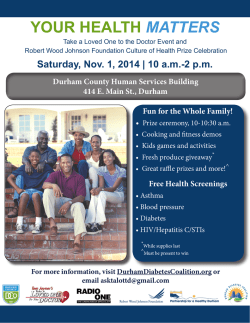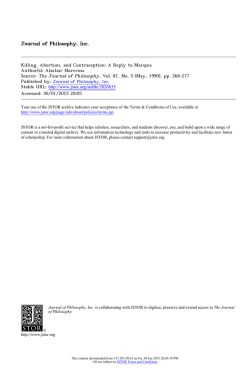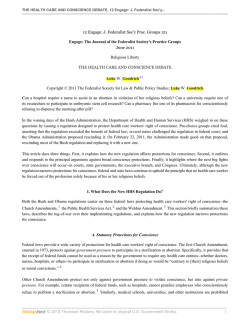
AIUK DOJ NI SUBMITTED COPY
Amnesty International UK THE CRIMINAL LAW ON ABORTION LETHAL FOETAL ABNORMALITY AND SEXUAL CRIME January 2015 Amnesty International UK 397 Ormeau Road, Belfast, BT7 3GP Contact: Gráinne Teggart [email protected] 028 9064 3000 www.amnesty.org.uk/ni Introduction Amnesty International UK (AIUK) is a national section of a global movement of over three million supporters, members and activists. We represent more than 250,000 supporters in the United Kingdom. Collectively, Amnesty International’s vision is of a world in which every person enjoys all of the human rights enshrined in the Universal Declaration of Human Rights and other international human rights instruments. Our mission is to undertake research and action focused on preventing and ending grave abuses of these rights. We are independent of any government, political ideology, economic interest or religion. Since the publication of the Department’s consultation paper, we note that the Northern Ireland Human Rights Commission has issued legal proceedings against the Department of Justice to change the law to allow for abortion in cases of severe malformation of the foetus, rape and incest. Amnesty International would like to make clear that international human rights standards provide for abortion in cases of severe foetal abnormalities and where a pregnancy is a result of sexual crime e.g. rape, therefore anything less than this would not be human rights compliant. Whether change to our abortion laws is brought about by legal challenge or otherwise, legislative change is essential to bring Northern Ireland into line with international human rights standards and put an end to the daily attack on women's reproductive rights in Northern Ireland. A recent opinion poll commissioned by Amnesty International and carried out by Millward Brown Ulster, has shown that 7 in 10 people support changes to abortion laws in Northern Ireland. A full copy of this research is appended, in summary; - 69% of people think the law in Northern Ireland should make access to abortion available where the pregnancy is the result of rape; - 68% of people think the law in Northern Ireland should make access to abortion available where the pregnancy is the result of incest; - 60% of people think the law in Northern Ireland should make access to abortion available where the foetus has a fatal abnormality. General comment At the outset, AIUK takes this opportunity to remind the Northern Ireland Department of Justice that restrictive abortion laws are gender-discriminatory, denying women and girls treatment only they need.1 AIUK demands the full decriminalization of voluntary abortion in all cases, subject only to such limitations as would be reasonable for any other type of medical intervention, and further demands that states ensure access to safe and legal abortions in at a minimum, cases of risk to mental and physical health, or in circumstances where pregnancy is a result of sexual violence, rape or incest. This is in line with international human rights standards, and would be a critical step to ensure that women in Northern Ireland can access the most appropriate health care, without the threat of prosecution. The Parliamentary Assembly of the Council of Europe, in affirming “the right of all human beings, in particular women, to respect for their physical integrity and to freedom to control their own bodies”, has stated that “the ultimate decision on whether or not to have an 1 See UN Committee on the Elimination of All Forms of Discrimination against Women, General Recommendation No. 24: Article 12 Of the Convention (women and health), paras. 14 and 31 (c) abortion should be a matter for the woman concerned, who should have the means of exercising this right in an effective way.”2 It has invited member states of the Council of Europe to “allow women freedom of choice and offer the conditions for a free and enlightened choice without specifically promoting abortion.”3 State failure to positively ensure effective access to abortion and post-abortion care under the above-noted grounds is interpreted as a violation of women’s rights to life and health, and can rise to the level of torture and other ill-treatment. Article 6, the right to life, under the ICCPR is interpreted as requiring states parties to take positive measure to ensure the right to life,4 including measures to ensure women “do not have to undergo life-threatening clandestine abortions.’5 CEDAW, in its General Recommendation No. 24 (20th session, 1999) (article 12 : Women and health) requires “all health services to be consistent with the human rights of women, including the rights to autonomy, privacy, confidentiality, informed consent and choice.” 6 Abortion in criminal law International human rights bodies have repeatedly criticized the criminalization of abortion.7 They have recognized that the criminal regulation of abortion impedes women’s access to lawful abortion and post-abortion care. Rather than restricting access to abortion, the law in effect restricts women’s access to safe abortion. This is especially true when severely restrictive laws are in place, such as those in Northern Ireland.8 Health-care providers and women are reluctant to respectively deliver or seek services and information under any circumstance, including those permitted by law, where there is a risk of prosecution and imprisonment.9 In its ruling in the case of A, B, and C v Ireland, the European Court of Human Rights said it considered it evident that the criminal provisions on abortion “would constitute a significant chilling factor for both women and doctors in the medical consultation process” and that women would be deterred from seeking legal and necessary care, and doctors from providing it, because of this chilling effect.10 AIUK considers that criminal law governing this form of women’s healthcare and the ongoing failure of the Department of Health, Social Services Public Safety to publish termination of pregnancy guidance contributes to a chilling factor giving rise to reluctance amongst medical professionals to provide abortion services within existing Northern Ireland law. 2 Parliamentary Assembly of the Council of Europe Resolution 1607 (2008) Access to safe and legal abortion in Europe, para.6 Parliamentary Assembly of the Council of Europe Resolution 1607 (2008) Access to safe and legal abortion in Europe. para. 7.3 4 Human Rights Committee, General Comment 6: The right to life (Article 6) (Sixteenth session, 1982), in Compilation of General Comments and General Recommendations Adopted by Human Rights Treaty Bodies, at 127, para. 5, U.N. Doc. HRI/GEN/1/Rev.6 (2003). 5 Human Rights Committee, General Comment 28: Equality of Rights Between Men and Women (Art. 3), (Sixty-eighth session, 2000), U.N. Doc. CCPR/C/21/Rev.1/Add.10 (2000), reprinted in Compilation of General Comments and General Recommendations Adopted by Human Rights Treaty Bodies, at 179, para. 10, U.N. Doc. HRI/GEN/1/Rev.6 (2003). 6 http://www.un.org/womenwatch/daw/cedaw/recommendations/recomm.htm#recom24 (31e) 7 See, for example, Human Rights Committee, Concluding Observations: Argentina, para. 13, U.N. Doc. CCPR/C/ARG/CO/4 (2010); El Salvador, para. 10, U.N. Doc. CCPR/C/SLV/CO/6 (2010); Mexico, para. 10, U.N. Doc. CCPR/C/MEX/CO/5 (2010); Monaco, para. 10, U.N. Doc. CCPR/C/MCO/CO/2 (2008); Nicaragua, para.13, U.N. Doc. CCPR/C/NIC/CO/3 (2008). 8 Human Rights Watch, A State of Isolation: Access to Abortion for Women in Ireland, January 2010; Human Rights Watch, The Second Assault: Obstruction Access to Abortion after Rape in Mexico, March 2006. 9 A, B and C v Ireland [2010] ECHR 2032, Application no 25579/05 para 254 10 European Court of Human Rights, Case of A,B, and C v. Ireland, Judgment of 16 December 2010, para 254. 3 Marginalised groups UN treaty bodies have recognized the discriminatory effects of criminal regulation on women’s access to lawful abortion on the compounded basis of sex, race, age and income.11 Women belonging to socio-economically advantaged groups circumvent the law in Northern Ireland by travelling. Women belonging to vulnerable and disadvantaged groups, including those unable to travel abroad, are required to access care through the public system and in practice disproportionately suffer the harms of the chilling effect aforementioned. The UN Human Rights Committee, in its concluding observations to Ireland in 2014 recognised this impact on vulnerable groups. “The Committee reiterates its previous concern regarding the highly restrictive circumstances under which women can lawfully have an abortion in the State party owing to article 40.3.3 of the Constitution and its strict interpretation by the State party. In particular, it is concerned at: (i) the criminalization of abortion under section 22 of the Protection of Life During Pregnancy Act, including in cases of rape, incest, fatal foetal abnormality and serious risks to the health of the mother, which may lead to up to 14 years of imprisonment, except in cases that constitutes a “real and substantive risk” to the life of a pregnant women; (ii) the lack of legal and procedural clarity concerning what constitutes “real and substantive risk” to the life, as opposed to the health, of the pregnant women; (iii) the requirement of an excessive degree of scrutiny by medical professionals for pregnant and suicidal women leading to further mental distress; (iv) the discriminatory impact of the Protection of Life During Pregnancy Act on women who are unable to travel abroad to seek abortions; (v) the strict restrictions on the channels via which information on crisis pregnancy options may be provided to women and the imposition of criminal sanctions on healthcare providers who refer women to abortion services outside the State party under the Regulation of Information (Services outside the state for the Termination of Pregnancies) Act of 1995; and (vi) the severe mental suffering caused by the denial of abortion services to women seeking abortions due to rape, incest, fatal foetal abnormality or serious risks to health (arts. 2, 3, 6, 7, 17, 19 and 26).” 12 Part 1 – Lethal foetal abnormality International and regional human rights treaty provisions protecting the right to life and the official bodies that interpret articles protecting life and other human rights guarantees do not extend such protections prenatally.13 No international or regional human rights body has ever recognized the foetus as a subject of protection under international human rights treaties. International and European standards, do however, support numerous state measures that support the development of prenatal life through the protection of the 11 Concluding Observations of the CEDAW Committee: Ireland, para. 185, U.N. Doc. A/54/38 (1999). www.ccprcentre.org/doc/2014/07/CCPR_C_IRL_CO_4_17700_E.doc 13 The Inter-American Convention on Human Rights, which is the only convention to have a provision which protects life prenatally, has been interpreted by the Inter-American commission not to confer and equivalent right to life on the foetus or require invalidation of permissive abortion laws. See Baby Boy, Case 2141, Inter-American Convention on Human Rights 25/OEA/ser.L./V/II.54, Doc. 9 Rev.1 (1981) 12 pregnant woman.14 Moreover, international human rights bodies have found restrictions on access to abortion in law or in practice to be a violation of state obligations.15 Governments have been held accountable for not ensuring that abortion is available in cases when the life or health of women and girls is in danger, in cases of fatal foetal impairment and in cases of rape or incest.16 The Human Rights Committee has recently criticised Ireland’s “criminalization of abortion under section 22 of the Protection of Life during Pregnancy Act 2013, including in cases of rape, incest, fatal foetal abnormality and serious risks to the health of the mother,” calling on the state to revise its constitution and legislation to provide for additional exceptions in such cases.17 In its 2005 decision in K.L. v. Peru, the Human Rights Committee found that compelling a 17-year-old girl to carry an anencephalic foetus to term violated Article 7 of the ICCPR (the right to be free from torture and other ill-treatment), an absolute right not dependent on whether or not abortion is lawful on that ground. It also found the state arbitrarily interfered with her private life, and failed to provide her with the special care she needed as a child. In finding the right to privacy violated, the Committee recognized that the existing provision of the law allowing for abortion on health grounds (there is no explicit foetal impairment ground in Peru’s law) entitled her to a lawful abortion. Anencephaly, the absence of a major portion of the brain during embryonic development, nearly always results in stillbirth or death within hours or days of birth.18 The UN treaty bodies have not limited their calls for access to abortion to cases in which foetal impairments are such that stillbirth or death immediately after birth is a virtual certainty. The CEDAW has called for access to abortion in cases of “severe” (rather than “fatal”) foetal impairment in recent concluding observations. In its July 2014 concluding observations on Peru, for example, the committee recommended that the state “[e]xtend the grounds for legalization of abortion to cases of rape, incest and severe foetal impairment.”19 Similarly, the committee noted in its 2012 concluding observations on Chile: [T]he Committee deeply regrets that all the recent parliamentary initiatives aimed at decriminalizing abortion have failed in the State party, including those where the health or life of the mother are at risk, in cases of serious foetus malformation or rape.20 More often, the UN treaty bodies have made general calls for access to “therapeutic abortions,” meaning abortions that are indicated for medical reasons, without specifying what those medical reasons might be. For example, the Committee against Torture called on Nicaragua “to consider the possibility of providing for exceptions to the general prohibition of abortion for cases of therapeutic abortion and pregnancy resulting from rape or incest.” 21 14 See, for example, CEDAW Article 12; CEDAW General Recommendation 24 on Women and Health, 1999, para. 31(c). See, for example, L.C. v. Peru, CEDAW Committee, 2011; KL v Peru, Human Rights Committee, 2005; LMR v Argentina, Human Rights Committee, 2007. 16 K.L. v Peru, Human Rights Committee, 2005; LC v Peru, CEDAW Committee, 2011; LMR v Argentina, Human Rights Committee, 2007). 17 Human Rights Committee, Concluding Observations on the Fourth Periodic Report of Ireland, U.N. Doc. CCPR/C/IRL/CO/4 (19 August 2014), ¶ 9. 18 Human Rights Committee, Views: K.L. v. Peru, Communication No. 1153/2003, U.N. Doc. CCPR/C/85/D/1153/2003 (22 November 2005), ¶¶ 6.2, 6.4, 6.5, available at http://reproductiverights.org/sites/crr.civicactions.net/files/documents/KL%20HRC%20final%20decision.pdf 19 Committee on the Elimination of Discrimination against Women, Concluding Observations on the Combined Seventh and Eighth Periodic Reports of Peru, U.N. Doc. CEDAW/C/PER/CO/7-8 (24 July 2014), ¶ 36(a). 20 Committee on the Elimination of Discrimination against Women, Concluding Observations on the Fifth and Sixth Periodic Reports of Chile, U.N. Doc. CEDAW/C/CHL/CO/5-6 (12 November 2012), ¶ 34. 21 Committee against Torture, Concluding Observations: Nicaragua, U.N. Doc. CAT/C/NIC/CO/1 (10 June 2009), ¶ 16. 15 Amnesty refers the Department to the fact that in all the individual complaints filed to the UN human rights bodies on failure to ensure access to abortions, the Committees found human rights violations, including the rights to equality and non-discrimination, the right to privacy and the right to be free from torture and other cruel, inhuman and degrading treatment. These cases involved denial of access to abortion in cases of rape and in a case of fatal foetal abnormality.22 The Children’s Rights Committee has also called on at least one state to adopt guidelines making it clear to doctors that they can legally perform abortions on grounds of severe foetal malformation under the existing health exception of a law, where no explicit foetal impairment exception exists.23 Recommendation: Amnesty recommends that the term ‘severe’ foetal abnormality is used in legislation and option 3 – no statutory definition provided; this would then permit the medical practitioner to decide whether a condition could be defined as severe. Part 2 – Sexual Crime Violence against women is a violation of fundamental human rights, including right to life, health and the right to be free from torture and other ill-treatment. Violence against women also constitutes a form of discrimination against women.24 Treaty monitoring bodies widely agree that abortion should be legal when a pregnancy results from rape and have repeatedly urged countries to amend their laws to this effect.25 They have also urged states to take measures to provide for implementation mechanisms to ensure availability and accessibility of abortion on rape and incest grounds and to also adopt relevant medical standards.26 The CEDAW Committee, in a case of denial of abortion to a suicidal young girl who had been raped, recommended that the state take measures to ensure access to abortion in cases of rape and that the life and health of a pregnant woman or girl are prioritized over protection of the foetus.27 The World Health Organization (WHO) has clearly indicated that women who become pregnant as a result of rape should have access to safe abortion services.28 To facilitate 22 See L .C. v. Peru, CEDAW Committee, 2011; KL v Peru, Human Rights Committee, 2005 and LMR v Argentina, Human Rights Committee, 2007 23 Children’s Rights Committee Concluding Observation to Costa Rica, para. 63 (2011) CEDAW Committee, General Recommendation. no. 19 on Violence Against Women, 1992, para. 6. 25 See, e.g., CRC/C/ARG/CO/3-4, para. 59 (2010) (“The Committee recommends that the State party.. Take urgent measures to reduce maternal deaths related to abortions, in particular ensuring that the provision on non-punishable abortion, especially for girls and women victims of rape, is known and enforced by the medical profession without intervention by the courts and at their own request”); E/C.12/PER/CO/2-4. para. 21 (“it recommends that the criminal code be amended so that consensual sexual relations between adolescents are no longer considered as a criminal offence and that abortion in case of pregnancy as a result of rape is not penalized.”); E/C.12/KEN/CO/1, para. 33 (“The Committee recommends that the State party ensure affordable access for everyone, including adolescents, to comprehensive family planning services, contraceptives and safe abortion services, especially in rural and deprived urban areas, by ... decriminalizing abortion in certain situations, including rape and incest.”); CCPR/C/GTM/CO/3, para. 20 (“The State party should, pursuant to article 3 of its Constitution, include additional exceptions to the prohibition of abortion so as to save women from having to resort to clandestine abortion services that endanger their lives or health in cases such as pregnancy resulting from rape or incest .”). 26 CEDAW Committee, Concluding Observations: Kuwait, para. 43(d), U.N. Doc. CEDAW/C/KWT/CO/3-4 (2011). 24 27 28 L.C. v. Peru, CEDAW Committee, 2011, para. 8.15; see also, CEDAW Concluding Observation to Hungary, 2013, para. 30. Safe abortion: technical and policy guidance for health systems, Second edition - World Health Organization, Department of Reproductive Health and Research, at 92 (“The protection of women from cruel, inhuman and degrading treatment requires that those who have become pregnant as the result of coerced or forced sexual acts can lawfully access safe abortion services.”). http://www.who.int/reproductivehealth/publications/unsafe_abortion/9789241548434/en/ access to abortion services in such cases, the WHO advises that states should elaborate standards and guidelines for both police and healthcare providers, including referrals to abortion services.29 Women should be provided safe, legal abortion services based on their complaint of the rape,30 and should not be compelled to undergo unnecessary administrative or judicial procedures, such as pressing charges against the perpetrator, identifying the rapist or providing forensic evidence of the rape.31 The WHO has noted that such requirements can delay access to abortion services, or may prevent access to services altogether, such as where there are gestational limits for the abortion and women cannot meet the requirements in time and in instances when women do not want to report the rape due to fear of stigma.32 In 2013 the UN Human Rights Committee called on Bolivia to “[l]ift the requirement for prior court authorization for therapeutic abortions and abortions following rape, statutory rape or incest in order to effectively guarantee access to legal, safe abortions.”33 Recommendation: Amnesty recommends that Department of Justice legislates to make abortion services available where pregnancy is result of a ‘sexual crime’. This service should be offered to any woman presenting herself to medical staff requesting a termination of pregnancy on these grounds, without being compelled to undergo unnecessary administrative or judicial procedures, such as pressing charges against the perpetrator or identifying the rapist. Part 3 - Conscientious objection Amnesty would view it as vitally important that it is made clear in law, and accompanying guidance, that a right to conscientious objection is not absolute and would not apply in cases where there is a risk to the woman’s life or an immediate risk to her health. A woman’s right to life, health and dignity must always take precedence over the right of a health care professional to exercise conscientious objection to participation in an abortion procedure. Conscientious objection should only be permitted insofar as the person seeking care can still be guaranteed timely and appropriate quality care. The right to conscientious objection must also only apply to the abortion procedure itself – not pre and post care. These points are also reflected in the recent case of Doogan and Wood v NHS Greater Glasgow and Clyde Health Board.34 AIUK welcomes the ruling of the Supreme Court on 17th December 2014 that the right to conscientious objection extends only to those who are directly concerned in the provision of treatment to women undergoing abortion. Amnesty brings the Department’s attention to standards set by the European Court of Human Rights which has said where states allow abortion they must ensure its access, 29 WHO Safe Abortion Guidance, page. 69; WHO Safe Abortion Guidance, page. 92-93. 30 WHO Safe Abortion Guidance, at 92-93. 31 WHO Safe Abortion Guidance, at 69; WHO Safe Abortion Guidance, at 92-93. 32 WHO Safe Abortion Guidance, at 92-93 33 UN Doc. CCPR/C/BOL/CO/3, para. 9 http://tbinternet.ohchr.org/_layouts/treatybodyexternal/Download.aspx?symbolno=CCPR%2fC%2fBOL%2fCO%2f3&Lang=en 34 https://www.supremecourt.uk/decided-cases/docs/UKSC_2013_0124_Judgment.pdf including regulating the practice of conscientious objection. The Court, in two separate cases where a woman and a girl faced barriers in accessing abortion, in part because of the practice of conscientious objection, noted that the Convention does not protect every act motivated or inspired by religion and that ‘…States are obliged to organise the health services system in such a way as to ensure that an effective exercise of the freedom of conscience of health professionals in the professional context does not prevent patients from obtaining access to services to which they are entitled under the applicable legislation.’35 The Court found violations of Article 8 of the Convention for failing to do so. UN CEDAW Committee has stated, with regard to reproductive health services generally, “If health service providers refuse to perform such services based on conscientious objection, measures should be introduced to ensure that women are referred to alternative health providers.”36 In his 2011 report to the United Nations General Assembly, the Special Rapporteur on the right to health cites inadequate regulation of conscientious objection as a legal restriction that contributes to making legal abortions inaccessible. “Conscientious objection laws create barriers to access by permitting health-care providers and ancillary personnel, such as receptionists and pharmacists, to refuse to provide abortion services, information about procedures and referrals to alternative facilities and providers.37 He recommends that states “ensure that conscientious objection exemptions are well-defined in scope and wellregulated in use and that referrals and alternative services are available in case where the objection is raised by a service provider.”38 Recommendation: Amnesty recommends that the Department of Justice make clear in law and accompanying guidance that: • • • • 35 36 The right to conscientious objection is not absolute and would not apply in cases where there is a risk to the woman’s life or an immediate risk to her health; A woman’s right to life, health and dignity must always take precedence over the right of a health care professional to exercise conscientious objection to participation in an abortion procedure; Conscientious objection should only be permitted insofar as the woman seeking care can still be guaranteed timely and appropriate quality care; The right to conscientious objection must also only apply to the abortion procedure itself – not pre and post care. RR v Poland, para 206 (2011); P and S v Poland (2012, para 106). CEDAW Committee General Recommendation 24 on women and health (1999), para. 11 Report of the Special Rapporteur on the right of everyone to the enjoyment of the highest attainable standard of physical and mental health, U.N. Doc. A/66/254, para.24 38 Ibid., para 65 (m) 37
© Copyright 2026




